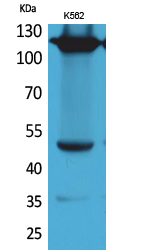
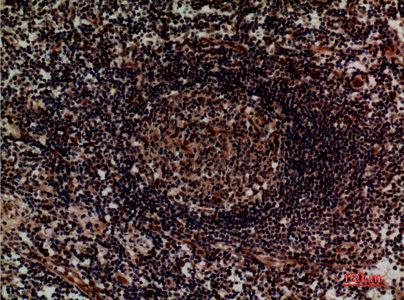
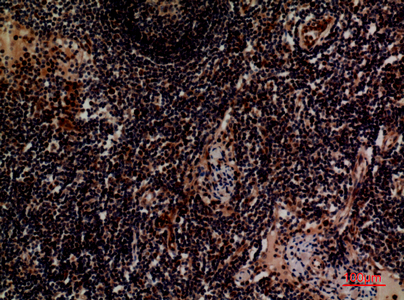
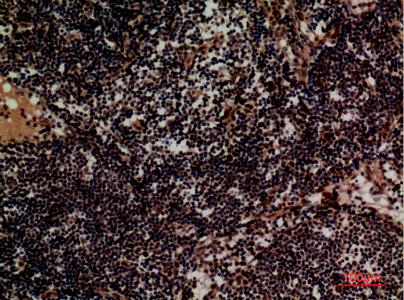
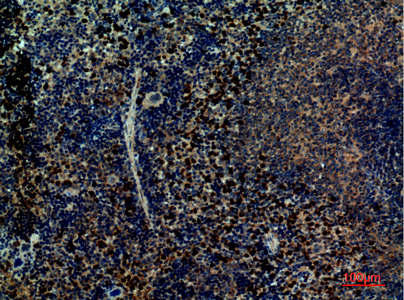
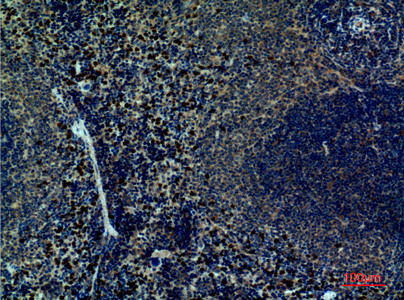
| WB | 咨询技术 | Human,Mouse,Rat |
| IF | 咨询技术 | Human,Mouse,Rat |
| IHC | 1/50-1/100 | Human,Mouse,Rat |
| ICC | 技术咨询 | Human,Mouse,Rat |
| FCM | 咨询技术 | Human,Mouse,Rat |
| Elisa | 1/10000 | Human,Mouse,Rat |
| Aliases | ITGA4; CD49D; Integrin alpha-4; CD49 antigen-like family member D; Integrin alpha-IV; VLA-4 subunit alpha; CD49d |
| Entrez GeneID | 3676 |
| WB Predicted band size | Calculated MW: 115 kDa; Observed MW: 120 kDa |
| Host/Isotype | Rabbit IgG |
| Antibody Type | Primary antibody |
| Storage | Store at 4°C short term. Aliquot and store at -20°C long term. Avoid freeze/thaw cycles. |
| Species Reactivity | Human,Mouse,Rat |
| Immunogen | The antiserum was produced against synthesized peptide derived from the Internal region of human ITGA4. AA range:571-620 |
| Formulation | Purified antibody in PBS with 0.05% sodium azide,0.5%BSA and 50% glycerol. |
+ +
以下是关于Integrin alpha 4抗体的3篇参考文献的简要列举:
---
1. **文献名称**: *Natalizumab: Alpha 4-integrin antagonist selective adhesion molecule inhibitors for MS*
**作者**: Miller, D.H., et al.
**摘要**: 该文献发表于《Expert Review of Neurotherapeutics》,讨论了抗α4整合素单克隆抗体Natalizumab在多发性硬化症(MS)治疗中的作用机制,通过抑制白细胞迁移至中枢神经系统来减少炎症反应,并总结了其临床试验中的疗效与安全性。
2. **文献名称**: *Anti-α4 integrin therapy for multiple sclerosis: Mechanisms and rationale*
**作者**: Lobb, R.R., Hemler, M.E.
**摘要**: 发表于《Journal of Clinical Investigation》,阐述了α4整合素在免疫细胞黏附和迁移中的关键作用,并揭示抗α4抗体通过阻断与VCAM-1等配体的结合,抑制炎症部位的白细胞浸润,为治疗自身免疫疾病提供理论基础。
3. **文献名称**: *The α4β7 integrin inhibitor vedolizumab for ulcerative colitis and Crohn's disease*
**作者**: Feagan, B.G., et al.
**摘要**: 该研究(《New England Journal of Medicine》)评估了靶向α4β7整合素的人源化抗体Vedolizumab在溃疡性结肠炎和克罗恩病中的疗效,证明其通过特异性阻断肠道淋巴细胞归巢,降低炎症反应且安全性较高。
---
以上文献涵盖临床治疗、机制研究及新药开发方向,均聚焦于Integrin alpha 4抗体在疾病干预中的应用与科学依据。
Integrin alpha 4 (α4) is a transmembrane glycoprotein subunit that pairs with β1 or β7 subunits to form heterodimeric adhesion receptors, such as α4β1 (VLA-4) and α4β7. These integrins mediate cell-cell and cell-extracellular matrix interactions by binding ligands like vascular cell adhesion molecule-1 (VCAM-1) and mucosal addressin cell adhesion molecule-1 (MAdCAM-1). They play critical roles in immune cell trafficking, inflammation, and tissue homeostasis by regulating leukocyte adhesion, migration, and signaling.
Antibodies targeting integrin α4 are designed to block these interactions, offering therapeutic potential in diseases driven by dysregulated immune cell infiltration. For example, natalizumab, a monoclonal antibody against α4 integrin, inhibits lymphocyte migration into the central nervous system and gut, making it effective in treating multiple sclerosis and Crohn’s disease. However, long-term use carries risks like progressive multifocal leukoencephalopathy (PML) due to suppressed immune surveillance.
Research on integrin α4 antibodies also extends to cancer, as α4 integrins facilitate tumor cell adhesion and metastasis. These antibodies are valuable tools for studying leukocyte biology, inflammation mechanisms, and therapeutic targeting of adhesion pathways. Their development highlights the balance between modulating immune responses and managing associated risks, underscoring the importance of patient-specific monitoring in clinical applications.
×